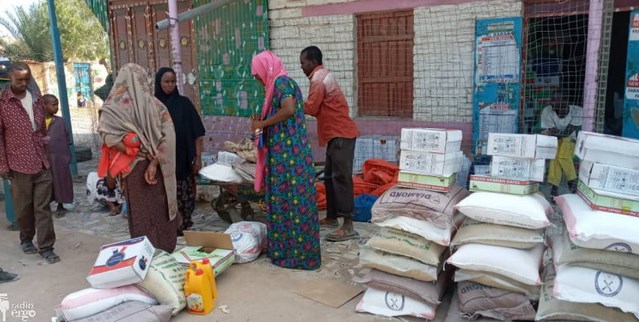
Friday January 7, 2022

Abdifatah Ahmed Hassan was extremely glad that his large family of two wives and 12 children were able to add a second meal to their paltry daily diet, after receiving emergency food aid targeting families severely affected by the drought in southwestern Somalia.
He was among 1,300 drought-displaced families in Elbarde and Rabdhure districts of Bakool region that received 25 kg each of rice, sugar, and flour and three litres of cooking oil from the UN’s World Food Programme (WFP) on 15 December.
Abdifatah already had been given the SIM card in his phone that enabled him to receive a notification to go to specified food stores to receive the food, which he divided between his two wives. The whole family fled to Elbarde in November, after he lost 32 of his 35 goats to the drought in Dhabri village, 18 km to the north.
He sold his last three goats for $36 and had bought food that they survived on for weeks by cooking one meal a day.
“I took the goats, which were very weak, to the market. Local residents of this town bought them. I used the money I got to buy wheat from a village on this side of the Ethiopian border, where everything is expensive. The money I got bought only a half bag of wheat,” he said.
The families receiving the food aid were pastoralists and farmers, who lost their animals and crops in the drought, and other struggling displaced families.
Abdifatah felt grateful for the food but worried about the future.
“It is tough out here, only God knows what will happen. We request the aid to be continued. Currently, only three out of every 10 families here have received the food that was distributed,” he said.
A local NGO, Action Sustainability Improvement Programme (ASIP), assisted WFP in verifying the beneficiaries’ details and checking that they received the food allocation from the specified stores.
ASIP food security and livelihood officer, Osman Abdi Ahmed, said displaced people in Rabdhure and Elbarde were prioritised for the aid although many were left out.
“We were asked to confirm if the selected people were in the two districts. We verified and recorded their telephone numbers and names and sent this to WFP. The selected people are much fewer than the actual number of families that have been affected by the drought in this area,” he said.
Osman said they are planning to carry out a second phase of mobile cash transfers for food aid in January 2022 for up to 2,500 families, who will receive the aid monthly for a year.
The families who received the food aid are those who were affected during previous droughts and were already registered by WFP. But many additional families who have been bankrupted by the current ongoing drought have not been signed up for the food aid.
Dahabo Abdirahman Kalif, a mother of seven, is sharing the food she received under the scheme with two neighbouring families.
“I am sharing it out of my own will since I can’t eat alone while my neighbour is hungry. If I was lucky enough to get the food, I thought I should share it with them since they are my neighbours,” she said.
Dahabo fled to Elbarde last October after losing 134 goats, 20 cows, and four donkeys to the drought in Geridab village, 16 km away.
She was managing to cook one meagre evening meal for her children with small earnings from casual laundry jobs that paid around $1.5 on the days she found work. She is still anxious, however, as the food aid is almost over and work is hard to find.
“People don’t wash their clothes every day. If you get a laundry job today, you won’t get one again for some days to come. We are living in hardship. We request the humanitarian organisations to continue assisting us with food,” she said.